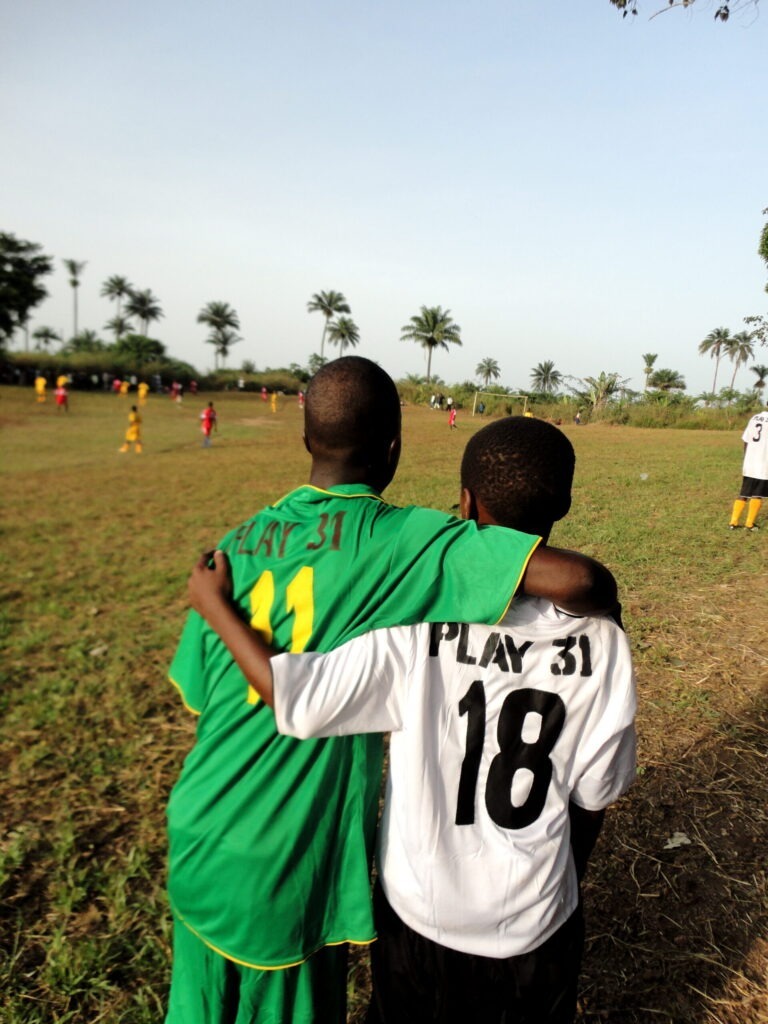 Imagine this: one village hosting a visiting team. The visiting team arrives early in the morning and after a few activities for the villagers to get to know each other, there are 3 football (soccer) matches–the junior game, the women’s game and the men’s match. After all this football playing there’s a big communal dinner and then an all night disco. Sounds like a pretty fun day, right?
Imagine this: one village hosting a visiting team. The visiting team arrives early in the morning and after a few activities for the villagers to get to know each other, there are 3 football (soccer) matches–the junior game, the women’s game and the men’s match. After all this football playing there’s a big communal dinner and then an all night disco. Sounds like a pretty fun day, right?
Now imagine that the villages have been in conflict with each for several years (or sometimes decades!) and this is the first time they’re coming together. It all becomes amazing, almost incredible! This is exactly what Play31 does in 3 rural areas in Sierra Leone–Kono, Kailahum, and Moyamba.
Play31’s mission is to use the unifying power of football in places that have been torn apart by war. The name stems from United Nations Convention on the Rights of the Child in which Article 31 states the right to play.
The idea for the organization came to Jakob Lund in 2008 when he was studying at Columbia University’s School for International and Public Affairs (SIPA). Every year, SIPA hosts human rights advocates from developing countries to develop their skills and networks in New York. Jakob hit it off with John Caulker, a visiting advocate from Sierra Leone, who invited him to come and intern at his organization over the break. So Jakob went off to intern in John’s organization and while in Sierra Leone met a bunch of boys he’d play football with. Moved by their mutual love of the game, but sad to see them playing with deflated blobs, Jakob spontaneously bought them a football. Back in New York, he raised $3000 and bought as many footballs as he could and sent them back to Sierra Leone. He quickly realized that football could be used to bring joy but also to bring people together and bring social change. The model shifted from donating footballs to kids to donating them to communities; he called these peace footballs.
Play31’s program has succeeded in places like a community in Kono which used to be one section, but got split into 2 during the civil war. This changed when Play31 introduced a football tournament and the two sections decided to create a single, unified team. It brought a sense of community that had been lost for a long time. When Play31 was first developing their concept, they considered doing mixed-village teams, but after talking to the participants, they realized that players are really proud to represent their own village and community. Especially for women’s teams, it is really important to have their community cheering for them; it brings them a sense of pride.
Often these matches organized by Play31 are the first time that these women are playing football. It is not only an opportunity for women to play a game so enjoyed by their male counterparts, but also a means of getting support from the men. In Sierra Leone, women were particularly targeted during the civil war and have borne that burden since then. For this reason, Play31 is specifically developing girls clubs that focus on teaching relevant skills, sexual health, human rights, conflict resolution and mediation.
Another program that is being expanded is the Peace Ambassadors one. Peace Ambassadors are individuals that are selected from each village that participates in the football tournaments. They are educated in human right, conflict resolution, trauma healing, and advocacy. The Peace Ambassadors are also tasked with maintaining a constructive atmosphere on match days. Sometimes they also participate in Peace Talks which are set up when villages have differences which a friendly football match can’t overcome.
But most of the time, it’s enough for Play31 to create a space and environment where people can get together and have fun together. Now that’s reconciliation!
Like Play31 on Facebook.

